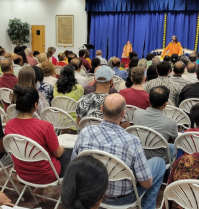The Mind and Social Behaviour
Inspirations for Living / April 01, 2014

Many of us have a very sensitive nature. When we are criticized or someone is annoyed with us, it disturbs us to no end; so much so, that sometimes the whole day is spend in brooding. Why is that so? Are we so averse or intolerant of criticism? People even wonder, “Why should I take his/her criticism?” This may not be possible as someone or other is bound to denounce your actions in some sphere of life or the other.
How can we insulate our mind and the mood from fluctuations based on the behavior of others?
The solution is to develop a better understanding of the world, based on scriptural knowledge. The Vedas say that this material energy, Maya, consists of three gunas: sattva guna, or the mode of goodness, rajo guna, or the mode of passion, and tamo guna, or the mode of ignorance.
Everyone’s mind too is made from Maya, and so the three modes of Maya exist in the mind as well. Depending upon the environment and where we focus our thoughts, one of the gunas becomes prominent and our mind takes on that quality.
If sattva guna dominates, one becomes peaceful, contented, generous, kind, helpful and serene. When rajo guna gains prominence, one becomes passionate, agitated, ambitious, envious of others success, and desirous for sense pleasures. When tamo guna becomes prominent, one is overcome by sleep, laziness, hatred, anger, resentment, violence, and doubt.
For example, let us suppose you are sitting in your library, engaged in study. There is no worldly disturbance, and your mind has become sattvic. After finishing your study, you sit in your drawing room and switch on the television. Seeing all the imagery makes your mind rajasic, and increases your hankering for sense pleasures. While you are watching your favorite channel, your family member comes and changes the channel to her liking. This disturbance causes tamo guna to develop in your mind, and you are filled with anger. In this way, the mind sways between the three gunas, and takes on the corresponding qualities.
This fluctuation takes place constantly in everyone’s minds, altering their thoughts amongst the three modes. When two people’s gunas are divergent, their ideas, interests, desires and tastes also become divergent, and that causes strife. This strife exists everywhere, between husband-wife, father-son, brother-sister, friend-companion, and so on. Congruence can happen only when two people have the same gunas. However, since everyone’s gunas are fluctuating, it is unreasonable to expect that the other person’s gunas will constantly match ours.
The reason for our anxiety is that we have unreasonable expectations. We want others to always think in the same manner as we do. And when this does not happen, we get disturbed. Instead if we could realize that invariably people will have differing views from ours, and this is very natural due to the three modes of material nature, we will not be disturbed when they oppose us or criticize us. So, by increasing our understanding of the world, we can insulate ourselves from the fluctuating moods of others.

























